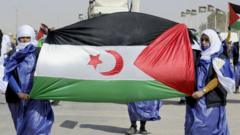In a significant shift in diplomatic policy, the UK has officially backed Morocco's autonomy plan for Western Sahara, marking a departure from its historical neutrality in the region's territorial dispute. This decision, announced by Foreign Secretary David Lammy during a visit to Rabat, signals the UK's support for Morocco's sovereignty over the mineral-rich territory while allowing for local governance.
UK Supports Morocco's Western Sahara Autonomy Plan Amid Business Interests

UK Supports Morocco's Western Sahara Autonomy Plan Amid Business Interests
The British government endorses Morocco's controversial proposal for Western Sahara, drawing criticism from Algeria and emphasizing investment in infrastructure projects.
Historically viewed as a "non-self-governing territory" by the United Nations, Western Sahara remains one of Africa's longest-standing conflicts, with Morocco controlling large portions and the Polisario Front advocating for independence on behalf of the Sahrawi people. For decades, British administrations have maintained a neutral stance on the sovereignty issue—until now.
During his visit, Lammy described Morocco’s plan as “the most credible, viable and pragmatic basis for a lasting resolution.” He formalized this endorsement by signing agreements aimed at enhancing collaboration between the two countries in preparation for the 2030 men's football World Cup, which Morocco will host alongside Spain and Portugal. Lammy emphasized that these projects would provide opportunities for British businesses in lucrative sectors, thus aligning diplomatic support with economic interests.
Algeria, which is aligned with Western Sahara's independence movement, expressed disappointment with the UK's new stance. They criticized the aging autonomy plan, claiming it had never served as a genuine starting point for negotiations with the Sahrawis. Furthermore, British diplomats indicated that the endorsement was contingent upon Morocco's commitment to self-determination, a revised autonomy plan, and a resurgence of dialogue.
Morocco’s Foreign Minister Nasser Bourita hailed the UK’s policy shift as a historic moment in their centuries-long relationship. He asserted that this change represents progress towards a definitive resolution of the territorial dispute.
Despite these developments, Western Sahara remains in a state of uncertainty. The UN has struggled to facilitate a referendum that would let the local population decide between independence or Moroccan governance, an issue that has seen little tangible resolution since the ceasefires negotiated in the 1990s.
The evolving relationship between the UK and Morocco not only highlights the complexities of international diplomacy but also underscores the intertwining of political and economic motivations on the global stage. As negotiations progress, the situation in Western Sahara continues to unfold, with implications for the stability of the region and the lives of its people.
During his visit, Lammy described Morocco’s plan as “the most credible, viable and pragmatic basis for a lasting resolution.” He formalized this endorsement by signing agreements aimed at enhancing collaboration between the two countries in preparation for the 2030 men's football World Cup, which Morocco will host alongside Spain and Portugal. Lammy emphasized that these projects would provide opportunities for British businesses in lucrative sectors, thus aligning diplomatic support with economic interests.
Algeria, which is aligned with Western Sahara's independence movement, expressed disappointment with the UK's new stance. They criticized the aging autonomy plan, claiming it had never served as a genuine starting point for negotiations with the Sahrawis. Furthermore, British diplomats indicated that the endorsement was contingent upon Morocco's commitment to self-determination, a revised autonomy plan, and a resurgence of dialogue.
Morocco’s Foreign Minister Nasser Bourita hailed the UK’s policy shift as a historic moment in their centuries-long relationship. He asserted that this change represents progress towards a definitive resolution of the territorial dispute.
Despite these developments, Western Sahara remains in a state of uncertainty. The UN has struggled to facilitate a referendum that would let the local population decide between independence or Moroccan governance, an issue that has seen little tangible resolution since the ceasefires negotiated in the 1990s.
The evolving relationship between the UK and Morocco not only highlights the complexities of international diplomacy but also underscores the intertwining of political and economic motivations on the global stage. As negotiations progress, the situation in Western Sahara continues to unfold, with implications for the stability of the region and the lives of its people.



















